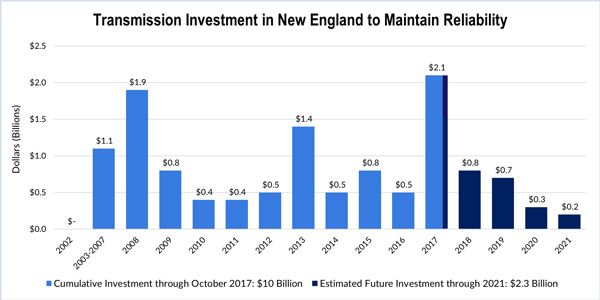By Michael Kuser
FERC on Thursday denied requests by New England transmission owners and the Edison Electric Institute for rehearing of its September 2016 ruling regarding complaints over the TOs’ base return on equity.
Since September 2011, numerous parties have filed complaints seeking reductions in the New England TOs’ base ROE.
The commission’s 2016 order established hearing and settlement judge procedures and a refund effective date for a complaint filed by an ad hoc group of municipal utilities, Eastern Massachusetts Consumers-Owned Systems, which contended that the New England TOs’ 10.57% base ROE (11.74% including incentives) should be reduced to 8.78% and 11.38%, respectively.
The commission’s Jan. 18 order rejected every argument made by the TOs, saying it “has repeatedly rejected the assertion that every ROE within the zone of reasonableness must be treated as an equally just and reasonable ROE in [a Federal Power Act] Section 206 proceeding” (EL16-64-001).
FERC in October rejected a bid by the TOs to increase their ROEs to the levels before they were lowered by a 2014 commission order vacated by an appellate court in April 2017. The commission said it would address the actual rate in a later remand order (ER15-414, EL11-66). (See FERC Rejects New England Tx Owners on ROE.)
The TOs also argued that constant litigation over the ROEs introduces risk and uncertainty in the ratemaking process.
They contended that the 15-month refund limitation in Section 206, as amended by the 1988 Regulatory Fairness Act, requires the commission to deny a complaint when a similar complaint is already pending.
“While Congress’ adoption of a 15-month refund limitation in the Regulatory Fairness Act gave public utilities some rate certainty in FPA Section 206 proceedings, the New England TOs misinterpret the level of certainty that Congress provided,” the commission said.
Following such logic “would prohibit any party from challenging a utility’s ROE as long as there is another complaint involving that utility’s ROE pending before [FERC], the commission said. “The language of FPA Section 206 does not support such a finding.”
The commission also rejected the TOs’ assertion that it had ignored “countervailing evidence regarding the cost of equity capital and the fact that the capital markets continue to remain unusual,” insisting it “had reviewed the pleadings and evidence submitted by all parties and found that the evidence raises issues of material fact that could not be resolved based upon the record before the commission. The hearing and settlement judge procedures established in the September 2016 order are the product of that review and are the appropriate vehicle to resolve the dispute.”




